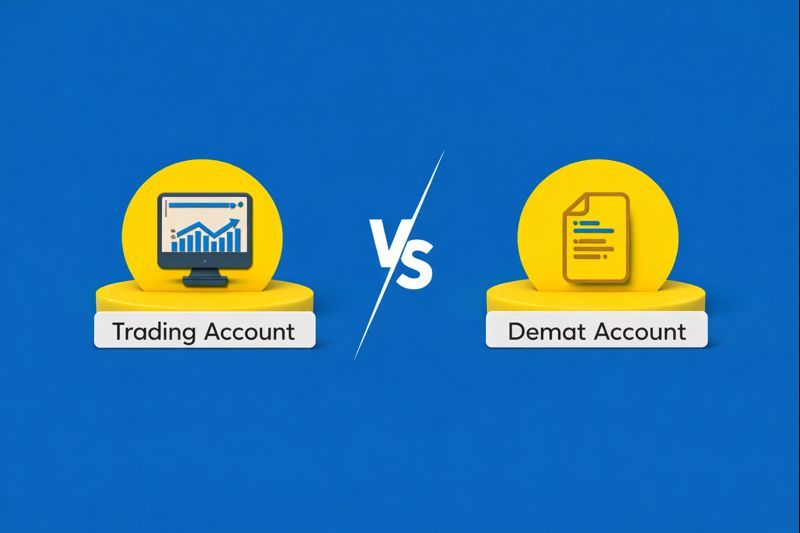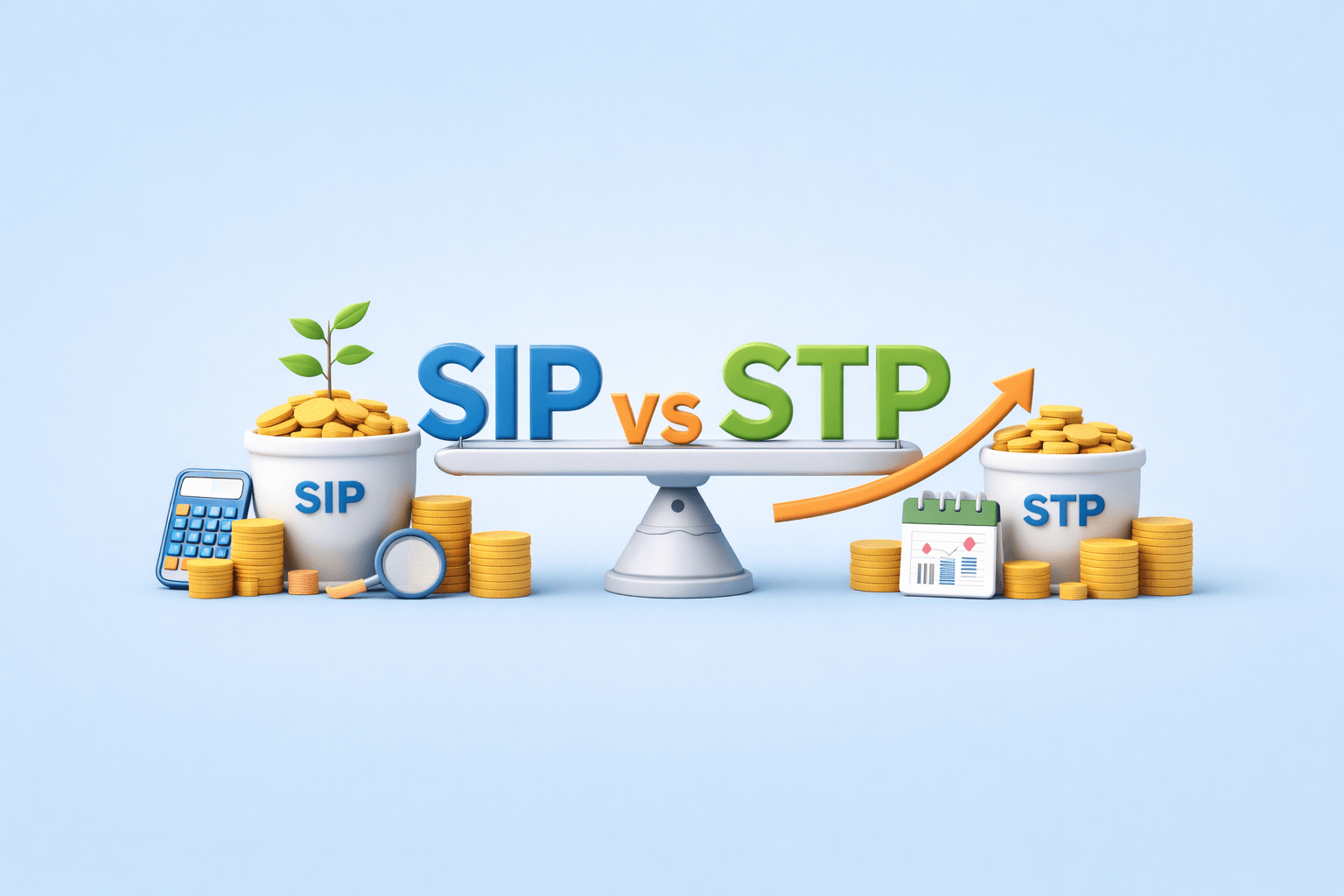- Home
- Blog
- Demat Account
- Difference Between Demat & Trading Account
- Difference Between Demat & Trading Account
Difference Between Demat & Trading Account

- Published Date: January 04, 2021
- Updated Date: December 31, 2025
- By Team Choice
If you’re planning to invest in stocks, mutual funds, or apply for an IPO, two terms will keep coming up - Demat account and trading account. While they are often used together, they are not the same. Each plays a distinct role in your investing journey, and confusing the two is a common beginner mistake.
In this blog, we’ll explain what is Demat account, what is trading account, the difference between Demat and trading account, how they work together in the Indian market, and the fees involved.
What Is a Demat Account?
A Demat (Dematerialised) account is used to hold your financial securities in electronic form. It stores shares, ETFs, bonds, mutual funds, and IPO allotments securely, eliminating the need for physical share certificates
In simple terms, a Demat account acts like a digital locker for your investments.
What Is a Trading Account?
A trading account is used to buy and sell securities in the stock market. It connects you to Indian stock exchanges like NSE and BSE and allows you to place orders for stocks, mutual funds, ETFs, and IPOs.
Think of a trading account as a transaction platform that enables market participation.
Difference Between Demat and Trading Account
Understanding the Demat vs trading account becomes easier when you compare their roles side by side.
| Basis | Demat Account | Trading Account |
|---|---|---|
| Primary Purpose | Acts as a Digital Locker to store assets. | Acts as a Market Gateway to place orders. |
| Nature of Balance | Shows Quantity (e.g., 50 units of an ETF). | Shows Liquid Cash (e.g., ₹10,000 for buying). |
| Transaction Type | Asset credits & debits (Storage). | Buy & Sell execution (Action). |
| Used For | Holding stocks, ETFs, IPOs, and mutual funds. | Trading in securities. |
| Annual Charges | AMC applies (usually ₹300-₹900/year). | ₹0 AMC (usually free to maintain). |
| Key Cost | Maintenance & DP Charges (when you sell). | Brokerage (Per-trade commission). |
| Regulatory Body | Depositories (NSDL / CDSL). | SEBI and Stock Exchanges (NSE / BSE). |
| Settlement | Assets move here on a T+1 basis. | Transactions happen instantly. |
Open a FREE Demat Account in 5 Mins.
- Free AMC for First Year
- Low DP Charges (₹ 10)
- No Auto Square Off Charges
- Free Research Calls
How Do Demat and Trading Accounts Work Together?
To invest in India, your bank, trading, and Demat accounts function as a triangular ecosystem. While they are separate accounts, they are digitally linked to ensure that money and shares move seamlessly.
As of 2025, India primarily operates on a T+1 (Trade + 1 Day) settlement cycle, with some stocks even moving to T+0 (Same Day). SEBI and exchanges are piloting T+0 settlement for a limited set of stocks; check NSE/BSE circulars for the current list.
Here is how the process works when you decide to buy shares:
- The Fund Transfer: You move money from your Bank Account to your Trading Account via UPI or Net Banking.
- The Transaction: You place a "Buy" order on the stock exchange (NSE/BSE) using your Trading Account.
- The Settlement: Once the trade is executed, the money is debited from your trading balance.
- The Delivery: Within 24 hours (T+1), the shares are electronically "delivered" to your Demat Account for safekeeping.
Pro-Tip: If you sell shares, the process reverses. However, you must authorise the debit from your Demat account using a T-PIN (provided by CDSL/NSDL) to ensure your holdings are secure.
“2-in-1” vs “3-in-1” Accounts in India
Most investors today choose between two popular account structures:
2-in-1 Account (Demat + Trading)
Offered mainly by discount brokers, this setup links your Demat and trading account, while your bank account remains separate.
- You manually transfer funds from your bank
- Lower brokerage costs
- Widely preferred by active traders
- Best for: Cost-conscious and experienced investors
3-in-1 Account (Savings + Demat + Trading)
Offered by some banks and full-service brokers, this structure integrates all three accounts.
- Automatic fund transfers
- Seamless experience
- Higher brokerage and charges
- Best for: Beginners who prioritise convenience over cost
Note: Regardless of whether you choose a 2-in-1 or 3-in-1 account, the core difference between a Demat and a trading account remains unchanged - storage vs execution.
How to Open a Demat Account Before a Trading Account?
There is no legal obligation to open a Demat and a trading account together. An investor can choose to open a Demat account independently, even without having a trading account at the time.
The Opening Checklist:
- Choose your DP: Select a Depository Participant (DP) registered with either NSDL or CDSL.
- Digital Application: Visit their website and enter your mobile number (must be linked to Aadhaar).
- Submit Documents (e-KYC):
- PAN Card: Mandatory for tax tracking.
- Aadhaar Card: Used for instant digital verification via OTP.
- Proof of Bank: A cancelled cheque or recent statement to link to where your dividends will go.
4. The "Nomination" Step (Mandatory): Per SEBI’s latest 2025 guidelines, you must either add a nominee (name, DOB, and relationship) or formally "Opt-out" using a declaration. You cannot leave this blank.
5. In-Person Verification (IPV): Most apps now do this via a 5-second live video or a "liveliness check" using your phone's camera.
6. e-Sign: Digitally sign your application using an Aadhaar-based OTP.
Once opened, you can later connect it to a trading account of your choice.
Can You Open a Trading Account Without a Demat Account?
The short answer is: Technically yes, but practically no. While a Demat account is functionally a "storage locker," and a Trading account is a "transaction tool," SEBI regulations and market risks have made them almost inseparable for the average investor.
Where a Demat is Not Functionally Required?
A Demat account is not strictly necessary if you are trading segments that are settled in cash and do not involve the ownership of an underlying asset.
- Currency Derivatives: Trading pairs like USD/INR.
- Commodity Derivatives: Trading Gold, Silver, or Crude Oil (provided they are cash-settled).
- Intraday Cash-Settled F&O: If you buy a Nifty Option and sell it before it expires, it is settled in cash.
Where is a Demat Mandatory?
Even though some trades happen in "cash," SEBI has implemented rules that make a Demat account essential for almost everyone:
- Equity Intraday: Even if you don't plan to hold shares overnight, SEBI mandates a Demat account for all equity segments. This is a safety net; if your intraday trade "fails" (e.g., the stock hits a circuit limit and you can't sell), the trade converts to Delivery. Without a Demat account, this conversion would fail, leading to heavy penalties.
- Physical Settlement in F&O: This is the biggest change. If you hold a Stock Future or Option until its expiry date, you are now legally required to take/give "Physical Delivery" of the actual shares. You cannot do this without a Demat account.
- IPOs and ETFs: You cannot apply for an IPO or buy an Exchange Traded Fund (ETF) without a Demat account, as these assets must be stored electronically.
In short, for cash‑settled derivatives, a Demat is not required; for equities and physically settled F&O, it is mandatory.
Charges of Demat and Trading Accounts
While opening an account is often free, there are recurring and transaction-based costs you must understand to calculate your actual profits.
1. Demat Account Charges (Storage Costs): These are fees related to the safekeeping of your shares.
- Account Opening Fee: Most modern brokers charge ₹0 to open a Demat account.
- Annual Maintenance Charge (AMC): A yearly fee for maintaining your digital locker. It typically ranges from ₹300 to ₹900.
(Pro-Tip: If your total investment is under ₹4 Lakh, you can request a BSDA (Basic Services Demat Account), which can have zero AMC. Based on SEBI’s latest BSDA (Basic Services Demat Account) slabs:
Holdings up to ₹4 Lakh: ₹0 AMC.
Holdings ₹4 Lakh – ₹10 Lakh: Maximum ₹100 AMC.
Holdings above ₹10 Lakh: Regular AMC (₹300–₹900).)
- DP (Depository Participant) Charges: This is the most "hidden" fee. You are charged ₹13.50 to ₹20 per company (ISIN), but only when you sell shares. It is not charged when you buy. (Charges vary by broker; confirm exact fees before opening)
2. Trading Account Charges (Transaction Costs): These are fees triggered when you actually place an order.
- Brokerage: The fee paid to your broker for executing the trade.
- Discount Brokers: Usually charge a flat ₹20 per trade or 0.1% (whichever is lower).
- Full-Service Brokers: May charge a percentage of the total trade value (e.g., 0.25% to 0.50%).
- Call & Trade Charges: If you call your broker to place an order instead of using the app, they may charge an extra ₹50 per order.
3. Statutory & Regulatory Charges (Government Taxes): These are mandatory for all brokers and are dictated by the Government and SEBI.
- STT (Securities Transaction Tax): The largest chunk of tax. For delivery trades, it is 0.1% on both buy and sell.
- GST: 18% on the sum of your (Brokerage + Transaction charges + DP charges).
- SEBI Turnover Fee: A tiny fee of ₹10 per crore of trade value.
- Stamp Duty: A small tax charged by the government (e.g., 0.015% on the buy side for delivery).
Note: Rates as per current regulations (2025); subject to change.
Conclusion
Understanding the Demat and trading account differences is essential before investing in the Indian stock market. While the trading account enables transactions, the Demat account safely holds your investments. Together, they form the backbone of investing in stocks, mutual funds, and IPOs.
With the right account structure and clear expectations around settlement and fees, investors can avoid confusion and invest confidently.
Frequently Asked Questions (FAQs)
1. Can I trade without a Demat account?
Yes, but only in limited cases like intraday trading or F&O. For delivery-based equity investing, a Demat account is mandatory.
2. Do I need both a Demat and a trading account?
Yes. To buy, sell, and hold securities in India, both accounts are required.
3. Is it possible to open a Demat or trading account with a partner?
You can open a joint Demat account. Trading accounts are usually single-holder.
4. Who is eligible to open a Demat and Trading Account?
Any Indian resident or NRI above 18 years with valid KYC documents can open these accounts.
5. Is a Demat account required to open a trading account?
Most brokers require both accounts to be opened together, even if you initially plan to trade intraday.
Recommended for you

Alternative Investment Funds (AIF): Meaning, Types, Benefits & How to Invest in India

FII DII Data - Live Data

Market Prediction Today (13th February 2026)
